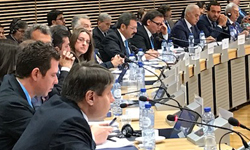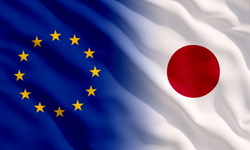BusinessEurope Headlines No. 2017-42
Open dialogue: key to improving EU-Turkey relations
 The second edition of the EU-Turkey Business Dialogue took place in Brussels on 8 December 2017, under the auspices of the High Level Economic Dialogue. Hosted by European Commission Vice-President Jyrki Katainen and Vice Prime Minister of Turkey, Mehmet Simsek, the event gathered a large number of business representatives that engaged in an open discussion on ways to support EU-Turkey trade and economic relations. Speaking on the issue of investments and access to finance, BusinessEurope’s Director General Markus J. Beyrer said: “Investors look for stability and predictability. Getting access to markets is a crucial but not the only factor; modern and enforceable rules that will help them operate in an economy in the most efficient manner are equally important. Therefore, Turkey should maintain the rapid pace of reforms in order to be able to attract new investments”. Participants highlighted that the modernisation of the Customs Union between the EU and Turkey can also provide a strong impetus to investment and trade. The next Business Dialogue is expected to take place in Turkey in the course of 2018.
The second edition of the EU-Turkey Business Dialogue took place in Brussels on 8 December 2017, under the auspices of the High Level Economic Dialogue. Hosted by European Commission Vice-President Jyrki Katainen and Vice Prime Minister of Turkey, Mehmet Simsek, the event gathered a large number of business representatives that engaged in an open discussion on ways to support EU-Turkey trade and economic relations. Speaking on the issue of investments and access to finance, BusinessEurope’s Director General Markus J. Beyrer said: “Investors look for stability and predictability. Getting access to markets is a crucial but not the only factor; modern and enforceable rules that will help them operate in an economy in the most efficient manner are equally important. Therefore, Turkey should maintain the rapid pace of reforms in order to be able to attract new investments”. Participants highlighted that the modernisation of the Customs Union between the EU and Turkey can also provide a strong impetus to investment and trade. The next Business Dialogue is expected to take place in Turkey in the course of 2018.
Contact: Sofia Bournou
Consequences of a cliff-edge Brexit: company examples
 BusinessEurope published on 7 December 2017 a compilation of 11 company cases highlighting the consequences of a potential cliff-edge Brexit for European businesses. Director General Markus J. Beyrer said: “The worst possible outcome for business would be a no-deal ‘cliff-edge’ Brexit. Business wants to avoid this. And companies need certainty and time to prepare and adjust to the post-Brexit situation. However, with time pressure rising, this possibility, although undesirable, is not entirely implausible”. The cases in the brochure represent both small and large European companies with activities in both the UK and the EU27, spanning various manufacturing and services sectors.
BusinessEurope published on 7 December 2017 a compilation of 11 company cases highlighting the consequences of a potential cliff-edge Brexit for European businesses. Director General Markus J. Beyrer said: “The worst possible outcome for business would be a no-deal ‘cliff-edge’ Brexit. Business wants to avoid this. And companies need certainty and time to prepare and adjust to the post-Brexit situation. However, with time pressure rising, this possibility, although undesirable, is not entirely implausible”. The cases in the brochure represent both small and large European companies with activities in both the UK and the EU27, spanning various manufacturing and services sectors.
![]() Contact: Stanislav Stanchev
Contact: Stanislav Stanchev
Promoting innovations for sustainability: what’s the right environment?
 “Accelerating innovation in the area of sustainability requires a collaborative approach involving governments, business and science, as well as consumers and increased value chain cooperation”, BusinessEurope Director of Entrepreneurship and Small and Medium-Sized Enterprises (SMEs) Daniel Cloquet said at a workshop organised by the Confederation of Junior Enterprises (JADE) in Brussels on 7 December 2017. He added that such an approach is vital to unleash the innovative potential of individual companies and collaborative partnerships. In the discussion, Cloquet stressed that well-designed regulations and price incentives may play a role in specific circumstances if they meet the international competitiveness test. BusinessEurope’s Circular Economy Industry Platform shows a number of examples of successful innovations led by business in the area of the circular economy.
“Accelerating innovation in the area of sustainability requires a collaborative approach involving governments, business and science, as well as consumers and increased value chain cooperation”, BusinessEurope Director of Entrepreneurship and Small and Medium-Sized Enterprises (SMEs) Daniel Cloquet said at a workshop organised by the Confederation of Junior Enterprises (JADE) in Brussels on 7 December 2017. He added that such an approach is vital to unleash the innovative potential of individual companies and collaborative partnerships. In the discussion, Cloquet stressed that well-designed regulations and price incentives may play a role in specific circumstances if they meet the international competitiveness test. BusinessEurope’s Circular Economy Industry Platform shows a number of examples of successful innovations led by business in the area of the circular economy.
![]() Contact: Daniel Cloquet
Contact: Daniel Cloquet
Gas directive proposal: not in line with better regulation principles
 BusinessEurope Director General Markus J. Beyrer wrote a letter to European Commission Vice-President Maroš Šefčovič on 13 December 2017 expressing BusinessEurope's concerns regarding the proposed revision of the gas directive. “Without prejudging the need for an overall reform of the gas market, the proposed recast focusing on ‘gas interconnectors’ raises serious questions of principle regarding the EU ‘better regulation’ agenda”, Beyrer stated. The proposal, he added, “represents a considerable change of the EU regulatory frameworks for interconnector gas pipelines, with possible impacts on numerous EU-third country relationships such as Russia, Morocco, Tunisia, Algeria, Libya, Israel and the United Kingdom (after Brexit).” Such a move would bring on critical questions, for instance the impact on mid- to long-term security of supply of Europe, but also on the functioning of the internal market. Therefore, BusinessEurope urges the European Commission to reconsider its approach.
BusinessEurope Director General Markus J. Beyrer wrote a letter to European Commission Vice-President Maroš Šefčovič on 13 December 2017 expressing BusinessEurope's concerns regarding the proposed revision of the gas directive. “Without prejudging the need for an overall reform of the gas market, the proposed recast focusing on ‘gas interconnectors’ raises serious questions of principle regarding the EU ‘better regulation’ agenda”, Beyrer stated. The proposal, he added, “represents a considerable change of the EU regulatory frameworks for interconnector gas pipelines, with possible impacts on numerous EU-third country relationships such as Russia, Morocco, Tunisia, Algeria, Libya, Israel and the United Kingdom (after Brexit).” Such a move would bring on critical questions, for instance the impact on mid- to long-term security of supply of Europe, but also on the functioning of the internal market. Therefore, BusinessEurope urges the European Commission to reconsider its approach.
![]() Contact: Cecily de Potesta
Contact: Cecily de Potesta
BusinessEurope welcomes the conclusion of the EU-Japan Free Trade Agreement
 Japan and the European Union announced the conclusion of negotiations for their free trade agreement on 8 December 2017. Comprising a third of global GDP, Japan and the EU are showing their commitment to rules-based trade at a time when protectionist sentiments are voiced in different countries. Our shared values, regulatory and product standards as well as food safety requirements meant that embarking on this agreement made a great deal of sense. The agreement will allow us to unlock much needed growth potential on both sides, create jobs, and eliminate tariffs, all while setting global standards for future trade deals and manage globalisation. Additional rules on intellectual property protection, equal opportunities to bid for government contracts, and rules on how to deal with competition issues all help to create a trade-enabling framework and encourage investment in each other’s economies. The European business community now looks forward to seeing the final text of the agreement, and is confident that both sides will also be able to agree on the best solutions to address the pending issues of data flows and investment protection. We expect that the final agreement will match high expectations, in areas of market access for goods and services, public procurement, and the removal of non-tariff barriers.
Japan and the European Union announced the conclusion of negotiations for their free trade agreement on 8 December 2017. Comprising a third of global GDP, Japan and the EU are showing their commitment to rules-based trade at a time when protectionist sentiments are voiced in different countries. Our shared values, regulatory and product standards as well as food safety requirements meant that embarking on this agreement made a great deal of sense. The agreement will allow us to unlock much needed growth potential on both sides, create jobs, and eliminate tariffs, all while setting global standards for future trade deals and manage globalisation. Additional rules on intellectual property protection, equal opportunities to bid for government contracts, and rules on how to deal with competition issues all help to create a trade-enabling framework and encourage investment in each other’s economies. The European business community now looks forward to seeing the final text of the agreement, and is confident that both sides will also be able to agree on the best solutions to address the pending issues of data flows and investment protection. We expect that the final agreement will match high expectations, in areas of market access for goods and services, public procurement, and the removal of non-tariff barriers.
Contact: Maurice Fermont
Calendar 
- 14-15 December: European Council & Eurozone Summit
- 18 December: Energy Council
- 20 December: SMS goods package
- 20 December: Capital Markets Union proposal
- 20 December: European Commission proposal for a revision of the Written Statement Directive
- 1 January: Bulgarian Presidency of the Council of the EU